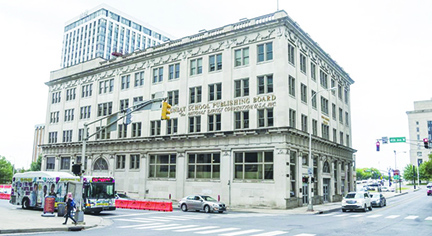By Rosetta Miller-Perry
There is a subtle, yet important and distinct difference between change and progress. Change is inevitable in all phases of life, but can be either positive or negative, depending on the circumstances, events and personalities involved. Progress represents improvement, something and/or someone seeing their situations benefited or advanced. For Nashville’s Black community, too many times in recent years we’ve seen more and more evidence of how much Nashville has changed, but we haven’t exactly seen or enjoyed many benefits from it. While other communities may indeed have progressed as a result of the continued, often unregulated and unchecked growth of the city, the Tribune has witnessed first hand how little of that has made its way into Black neighborhoods or aided the majority of Nashville’s African-American populace.
The latest example of that is the recent sale of the historic Morris building. For those unaware of it, the Morris Memorial Building was designed by the Black-owned architecture firm McKissack & McKissack in 1926 on land where Blacks were once sold into slavery. Now located at 330 Dr. Martin Luther King Jr. Blvd, it is also designated on the National Register of Historic Places, and billed as the only remaining building remaining in downtown Nashville originally associated with the Historic Black Business District.
Progress for Music City’s Black citizens would have been the establishment of a civil rights museum on this site, something that not only could and would have preserved its status as a historic locale, but also become a repository to chronicle this city’s historic involvement in the Civil Rights Movement, as well as celebrate the key roles that Black citizens have played in its evolution from its inception to the present. But instead, as another sign of change rather than progress the National Baptist Convention, the building’s owner for the past century, sold it for $6 million to an LLC managed by Michael Winarski. Winarski, the owner of the Brentwood-based WIN Building Group and WIN Development, then completed a $10 million deal to sell it to the hotel development company Imagine Hospitality.
“I love the building and the history behind it,” Imagine CEO Kal Patel told the Nashville Post when news of the sale initially surfaced on Dec. 14. “We want to build a boutique hotel and make sure that what we do still honors the history of the Black community.” The Tribune finds the notion of a for-profit hotel, as opposed to a Civil Rights Museum, far from something that honors the Black community. Perhaps if a Black-owned construction company were part of the building process, or there was significant Black involvement and input in the hotel’s creation, there might not be as much of a sting, but it still doesn’t provide the inspirational lift and historical significance a Civil Rights Museum would have.
The new O’Connell administration is on record saying they are supportive of a public-private partnership of some kind and interested in the preservation of the building. “My No. 1 goal is securing the preservation of the building,” Metro Councilmember Jacob Kupin, whose District 19 includes the structure, told the Post. “Additionally, I think the next steps would be speaking to the groups that have been advocating for saving the Morris Building.” Kupin added, “My personal goal is to make sure that this building continues to tell its story, and recognizes and appreciates what has occurred there and what it represents.”
Well, that all sounds good, but we’ve heard flowery rhetoric before. What the Tribune is most concerned about is this seems like another part of the overall impact of gentrification and unregulated change, which is erasing, negating or downplaying the significance of Black contributions and impact on the city, and doing things that put the profit of private corporations and developers ahead of the interests of Black citizens.
It follows in the footsteps of what we see on a daily basis across North Nashville, with condos going up and folks who’ve lived in communities for generations being approached by developers and offered penny-on-the-dollar deals to sell so high-end, more expensive structures can be erected in their place.
Just so no one misunderstands our point, the Tribune is not opposed to progress, and understand that nothing remains the same. But what we do oppose is allowing developers to dismantle decades of community solidarity through fiscal maneuvers, and subtly transforming the identity of a community while claiming to be promoting its growth and improvement. Jefferson Street’s Black business community needs to be strengthened through partnerships with the city rather than undercut by companies with no interest in either the history or the continuation of Black community traditions and heritage.
Those who consider this merely conspiracy theory or panic-driven propaganda should just take a look around and see the changes in the area. We’re certainly not hostile to newcomers, but we also don’t want to see those who’ve been a part of North Nashville for many decades driven out due to gentrification. When you see new high-rise apartments and condos going up, and get an idea of what the rents and/or prices are, it’s pretty clear that they’re targeted at high-income folks who want to live closer to downtown.
So the Tribune hopes that the O’Connell administration understands the difference between change and progress, and wants to ensure that the Black community which supported him in large numbers enjoys far more progress rather than just being witnesses to more unregulated and negative changes.
Remember, over the course of a century, white politicians and business owners have stripped Black downtown business owners and are currently moving toward historic Jefferson Street where there are more than 40 Black businesses, many who may not survive the next round.

